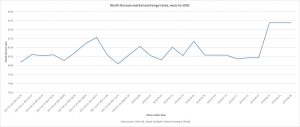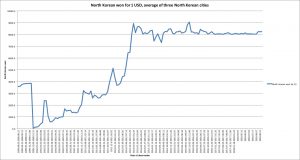By Benjamin Katzeff Silberstein
The economic aspect has been continuously front-and-center throughout the Moon-Kim summit in Pyongyang (September 19–20). From a diplomatic standpoint, this is not all that surprising. Moon and Kim are pursuing what appears to be a rather classical Sunshine 2.0 pattern, with roughly the same contents as the predecessor. As Yonhap reports:
Earlier in the day, the leaders of South and North Korea agreed to work together for balanced economic development on the Korean Peninsula.
South Korean President Moon Jae-in and North Korean leader Kim Jong-un agreed to break ground on a joint project to connect railways and roads across their border this year and vowed diverse cooperative projects to deepen their friendly ties and foster a reconciliatory mood.
The agreements were reached during summit talks held in Pyongyang between Moon and Kim.
“We will prepare for (inter-Korean economic cooperation) in a calm and orderly manner,” Finance Minister Kim Dong-yeon said in a meeting with reporters here.
“But inter-Korean economic projects can gather speed if circumstances improve,” he said.
The minister said any inter-Korean economic projects should need support from the international community, and there are still many things to be done in advance.
The latest agreement came months after the leaders reached a deal during their April summit to modernize and eventually connect rail and road systems across their divided border.
Field surveys have been carried out to examine the state of some sections of the North’s rail and road networks, but the process has not moved fast enough, apparently due to stringent sanctions imposed on the North for its nuclear program.
Railways and infrastructure are both less politically touchy than outright trade, and potentially mutually beneficial, even though the south will carry the economic burden:
“The South and the North agreed to explore practical measures aimed at increasing exchange and cooperation and seeking balanced development,” read a joint statement they signed after the summit.
“The two agreed to hold a ground-breaking ceremony this year for connecting railways and roads running along their eastern and western coasts,” it also stated.
The decision came months after the leaders reached a deal during their April summit to modernize and eventually connect rail and road systems across their divided border. The Seoul government has set aside nearly 300 billion won for next year to carry out those projects.
Field surveys have been carried out to examine the state of some sections of the North’s rail and road networks, but the process has not been fast enough, apparently because of global sanctions on the North.
The second point of the Pyongyang Declaration promises more economic cooperation for “balanced” growth, and vows to reopen projects such as the Kumgangsan tourism zone, and the Kaesong Industrial Park, according to Moon, “when conditions allow“. Here’s an English-language full-text version of the declaration. A particularly interesting but understudied point is 2.3, on ecological cooperation.
Kim Jong-un’s forestry interest has been a recurring theme throughout his tenure, and as this blog has covered, he’s spoken about the problems associated with excessive tree-felling – the root cause of which is North Korea’s planning failures of the 1990s – in more honest terms than his father did. At the very least, there’s been strong hints of both pragmatism and understanding of North Korea’s structural problems in the way that Kim has talked about the forestry issue (and many others too for that matter). Indeed, the Korea Forest Service chief accompanied Moon to Pyongyang, and he hopes to get to work soon following the summit:
“Forests surrounding populous urban areas were heavily destroyed, but forests in less populated regions were well-preserved,” Kim Jae-hyun said in a meeting with reporters at a government complex in Daejeon. “I saw enough hope.”
He was speaking after accompanying South Korean President Moon Jae-in’s visit to North Korea from Tuesday to Thursday.
As the first step, Kim said the Korea Forest Service will explore ways to create tree nurseries in much-destroyed regions.
“The North Korean side wants large-scale tree nurseries, but it would be more practical to start with small nurseries in regions suffering from deforestation the most,” he said.
In regard to disease and insect control efforts, the official said the use of machinery could be limited as the North is under U.N. sanctions for its missile and nuclear tests, while pesticides are allowed.
“I think (the disease and insect control measures) should start immediately to build trust between the two Koreas,” he said.
The forest expert said his North Korea visit as part of the official entourage showed Moon’s “willingness” to pursue inter-Korean cooperation in the forest sector.
“Looking down from an airplane along the western coastline, North Korea’s forests were very impressive,” Kim said. “There were few trees on hills near Pyongyang, while trees were well-maintained on the way from Sunan Airport to Baekhwawon guesthouse.”
Mountains near Yalu River on the North Korean border with China were denuded, but Mount Paekdu showed off all colors of beautiful trees, he said.
Moon and Kim aren’t the only ones who have talked about economic cooperation. The mayor for Busan, South Korea’s second most populated city, for example, has announced projects that his city will spearhead. Yonhap again:
Busan’s envisioned projects, unveiled in time for President Moon Jae-in’s historic visit to North Korea, call for boosting the city’s cooperation with the North in the fields of fisheries trade and processing, modernization of fishing vessels and equipment, shipbuilding, exhibitions and conventions and smart city technology, the city said.
The city will push to invite North Korean filmmakers and actors to the Busan International Film Festival and hold an inter-Korean film festival.
Nikkei Asian Review also reports that the Moon government has put pressure on Samsung and its head, Lee Jae-yong, to present a large-scale investment plan for North Korea. Samsung has manufactured TV:s in North Korea before, but this time around, the company hasn’t appeared as eager as its other chaebol-counterparts to draft up implementable blueprints for investments up north. Politically, it makes sense. Samsung’s PR hasn’t exactly been superb as of late, with the arrest and later release from prison of its CEO relating to corruption charges tied to the Choi Soon-sil/Park Geun-hye-scandal.
South Korea’s main steelmaker Posco is also hoping for opportunities following the summit:
The executive was part of the business delegation that accompanied President Moon Jae-in on his trip to North Korea earlier this week. Choi and other businessmen discussed various inter-Korean economic cooperation projects that can be pursued going forward if conditions are right.
“It will be a big opportunity not only for POSCO but for the steel industry as a whole,” Choi said. “I think POSCO will be able to find chances for growth.”
The company recently created a new task force to prepare for potential business opportunities in North Korea. POSCO Daewoo, POSCO Engineering & Construction Co. and POSCO Chemtech Co. are participating in the task force.
The steelmaker said it wants to play a key role in railroad and other infrastructure projects in line with the changes in the geopolitical environment in Northeast Asia.
My five cents on what all this entails for the North Korean economy:
Of course, as of yet, nothing. Most of the plans and visions are routinely accompanied by the caveat “when conditions allow”. The infrastructure plans may be able to go ahead even with sanctions in place, at least the rhetoric from the Moon administration, and the timetable for breaking ground on the railway connections before this year is over, seems to suggest so. I’m no expert on the judicial side of the sanctions, but it’s hard to imagine that this will be fully uncontroversial from that standpoint.
In any case, North Korea is in dire need of infrastructure improvements and if they are extensive enough, they should hopefully not just connect South and North Korea with Russia and China for cheaper freight, but also make domestic goods transportation simpler and more efficient, with positive impacts for the markets and private manufacturing in the country.
On re-opening Kaesong, things are a bit more complicated. In its nature, Kaesong is a manufacturing zone mostly cut off from the rest of North Korea. Sure, the incomes of the workers did enter the North Korean economy, and arguably, the fact that South Korean consumer goods could to some extent enter North Korean markets through Kaesong spurred competition for more high-quality goods on the North Korean market as well. But Kaesong is hardly the only, and perhaps not even the main route through which such products enter the country. These are also pretty weak arguments when you look at the entire economic picture.
The problem with Kaesong isn’t so much what it was/is/will be, but the missed opportunities. The hope with special economic zones tends to be that institutional frameworks that are tried there first can later spill over into the rest of the country. In the case of North Korea, the arrangement made pretty sure that that didn’t happen, at least from what we can tell. Had inputs been sourced from North Korea, that could also have spurred wider economic growth, at least in some regions. In theory, there are lots of opportunities for synergy and cooperation between South Korean companies and smaller North Korean ones, not just the state. If the goal is economic development in North Korea more broadly, and not just economic profit on the southern side and incomes for the north, there are lots of models that carry far greater potential.


